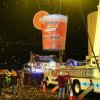Candidates will have to avoid the easy answers
Among the stranger Hillary Clinton emails outlined in a Washington Post story was one subject-lined “Gefilte fish.”
The entire message read, “Where are we on this?”
Gefilte fish is not a species of fish, but a dish made from ground-up carp or pike mixed with eggs, onions and breadcrumbs.
It’s most often associated with Jewish holiday meals, but can be served and not eaten year round.
I say “not eaten” because it’s an acquired taste, which is another way of saying many people don’t like it. (I do, but I enjoy all seafood except for jellyfish.)
But a secretary of state, of course, wouldn’t be asking about a Jewish holiday appetizer, so it was obviously a code name for some secret operation.
And now we know. Secretary of State Clinton really was talking about gefilte fish.
A Republican congressman from Illinois had contacted the State Department on behalf of a constituent who was trying to sell gefilte fish to Israel, which had embargoed a shipment.
You’ll be happy to know the matter was resolved before reaching the level of an international crisis. (“Day 15: The Carp Crisis in the Middle East.”)
But the incident sheds light on how much government works to promote business, often in unseen ways.
This Illinois Republican wanted the U.S. secretary of state to lobby on behalf of his constituent and he wanted it done pronto. Clinton, a Democrat, helped him.
With another election year looming, we’ll soon be hearing from politicians offering an easy way to rev up the economy: Get government out of the way and we’ll return to those thrilling days of yesteryear when “mom-and-pop” businesses popped up all over.
I don’t buy it.
Individual “mom and pop” convenience stores, for example, used to be common. Now, locally, the convenience store business is increasingly dominated by Wawa and Royal Farms.
I once heard a man complain that his convenience store had been put out of business by the government. Regulations were too onerous.
I had been to his convenience store. I doubt the government put him out of business. Wawa did. They ate his lunch partly because they served a good lunch - and a fresh cup of coffee any time of the day.
A few months back I spoke to the owner of a local liquor store, which are among the few businesses where quite a few “mom and pop” operations remain.
She had bought the store at the beginning of the recession, figuring liquor stores were as close to recession-proof as a business could be.
Sounded logical. After all, hard times call for hard liquor.
What she found, however, was that it was tough for the “mom and pops” to compete against the big outlets.
Liquor stores, she said, have to stock large quantities of name brands, such as Jim Beam and Budweiser.
But small stores don’t profit much from those brands. The larger outlets can make money selling Jim Beam - they’re buying at a lower price; the smaller stores, not so much.
This is happening all across our economy. Even Happy Harry’s, which was huge by Delaware standards, sold out to Walgreens because it was getting harder for smaller drug store chains to survive.
In a recent, rather disconcerting story in the News-Journal, a Delaware Business Roundtable member criticized the state’s efforts at spurring Delaware’s lackluster economy, but didn’t offer any solutions. The result could be large and increasing gaps in the state budget.
So what kind of businesses can thrive in today’s economy?
One hopeful example is PATS Aircraft Systems, located at the Delaware Coastal Airport in Georgetown (formerly the Sussex County Airport).
It’s quite a business. According to Cheryl Parker, vice president of people, PATS serves customers around the world.
The company, which employs about 300 people, refurbishes jets for extremely high-end customers, including heads of state.
Most of the customers come from outside the U.S., Parker said.
But PATS was running into problems with the airport’s runway. It wasn’t long enough for larger planes, such as the Boeing 757. This limited the company’s growth potential.
The good news is that the first of two 500-foot extensions has already been completed.
Already, Parker said, PATS is starting to see employment growth.
She expects that to continue; not explosive growth, but steady, controlled growth.
This progress, however, isn’t due solely to the hard work and good management at PATS. It was made possible with support from the county, state and federal governments.
We’ll always rely on individual entrepreneurs, but in today’s complicated global economy - and companies like PATS are very much part of that economy - governments will also play a role.
It will be up to candidates to avoid the easy answers and define what that role should be.
Don Flood is a former newspaper editor living near Lewes. He can be reached at floodpolitics@gmail.com.



















































